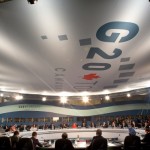G-20 meeting in China will focus less on U.S. monetary policy
The G-20 meeting of finance chiefs in Nanjing, China today will likely focus less on U.S. monetary policy and more on multiple disasters in Japan and the debt situation in European countries.
U.S. fiscal policy, specifically its alleged push of the dollar in the market, has been criticized heavily by Chinese authorities, with one Chinese economist blaming the U.S. for rising commodity prices in a published paper.
The meeting between G-20 leaders have been set seven months ago and economists predicted that the attention will center on not only U.S. monetary policy abroad but also the quantitative easing implemented by the Federal Reserve.
But the Fed earlier said that its $600 billion purchase of Treasury bonds will likely be the last since the U.S. economy is showing signs of a sustained recovery. Since the financial meltdown, the Fed has started at least two rounds of quantitative easing to help jumpstart the U.S. economy.
Attending the G-20 meeting today are U.S. Treasury Secretary Timothy F. Geithner, Chinese Vice Premier Wang Qishan, European Central Bank President Jean-Claude Trichet and French President Nicolas Sarkozy, who proposed the meeting.
The one-day seminar is a prelude to the Group of Twenty or G-20 summit in Cannes in November which will be more meaningful in terms of coming up with concrete solutions to economic problems and other issues facing the global economy.
Exchange rate issues, foreign trade, the European debt crisis, and other issues in the monetary system are just some of the topics expected to be tackled by the G-20 grouping of the world's biggest economies.
